BFT PHOBOS MA is an electromechanical piston designed for automatic operation of residential gates, offering a range of capabilities to enhance the user's experience.
- Irreversible gearmotor: The device features an irreversible gearmotor that locks the gate in both the closed and open positions, eliminating the need for an additional electric lock and ensuring enhanced security.
- Electronic torque limiter: The built-in electronic torque limiter provides precise control over the motor's force, ensuring smooth operation and preventing damage to the gate or the actuator in case of obstacles.
BFT PHOBOS MA is an electromechanical piston designed for automatic operation of residential gates, offering a range of capabilities to enhance the user's experience.
- Irreversible gearmotor: The device features an irreversible gearmotor that locks the gate in both the closed and open positions, eliminating the need for an additional electric lock and ensuring enhanced security.
- Electronic torque limiter: The built-in electronic torque limiter provides precise control over the motor's force, ensuring smooth operation and preventing damage to the gate or the actuator in case of obstacles.

ELECTROMECHANICAL
AUTOMATION FOR
SWING GATES
PHOBOS MA
D811318 15-04-02 Vers. 02

165
AUTOMATION FOR SWING GATES
AUTOMATION FOR SWING GATES
PHOBOS MA
PHOBOS MA
Thank you for buying this product, our company is sure that you will be more
than satisfied with the product’s performance. The product is supplied with
a “Warnings” leaflet and an “Instruction booklet”. These should both be
read carefully as they provide important information about safety, installation,
operation and maintenance. This product complies with the recognised
technical standards and safety regulations. We declare that this product is
in conformity with the following European Directives: 89/336/EEC and 73/
23/EEC, 98/37/CEE (and subsequent amendments).
1) GENERAL SAFETY
WARNING! An incorrect installation or improper use of the product
can cause damage to persons, animals or things.
• The “Warnings” leaflet and “Instruction booklet” supplied with this
product should be read carefully as they provide important information
about safety, installation, use and maintenance.
• Scrap packing materials (plastic, cardboard, polystyrene etc) according
to the provisions set out by current standards. Keep nylon or polystyrene
bags out of children’s reach.
• Keep the instructions together with the technical brochure for future
reference.
• This product was exclusively designed and manufactured for the use
specified in the present documentation. Any other use not specified in
this documentation could damage the product and be dangerous.
• The Company declines all responsibility for any consequences resulting
from improper use of the product, or use which is different from that
expected and specified in the present documentation.
• Do not install the product in explosive atmosphere.
• The construction components of this product must comply with the
following European Directives: 89/336/CEE, 73/23/EEC, 98/37/EEC
and subsequent amendments. As for all non-EEC countries, the above-
mentioned standards as well as the current national standards should
be respected in order to achieve a good safety level.
• The Company declines all responsibility for any consequences resulting
from failure to observe Good Technical Practice when constructing
closing structures (door, gates etc.), as well as from any deformation
which might occur during use.
• The installation must comply with the provisions set out by the following
European Directives: 89/336/CEE, 73/23/EEC, 98/37/EEC and
subsequent amendments.
• Disconnect the electrical power supply before carrying out any work on
the installation. Also disconnect any buffer batteries, if fitted.
• Fit an omnipolar or magnetothermal switch on the mains power supply,
having a contact opening distance equal to or greater than 3mm.
• Check that a differential switch with a 0.03A threshold is fitted just before
the power supply mains.
• Check that earthing is carried out correctly: connect all metal parts for
closure (doors, gates etc.) and all system components provided with an
earth terminal.
• Fit all the safety devices (photocells, electric edges etc.) which are
needed to protect the area from any danger caused by squashing,
conveying and shearing.
• Position at least one luminous signal indication device (blinker) where
it can be easily seen, and fix a Warning sign to the structure.
• The Company declines all responsibility with respect to the automation
safety and correct operation when other manufacturers’ components
are used.
• Only use original parts for any maintenance or repair operation.
• Do not modify the automation components, unless explicitly authorised
by the company.
• Instruct the product user about the control systems provided and the
manual opening operation in case of emergency.
• Do not allow persons or children to remain in the automation operation
area.
• Keep radio control or other control devices out of children’s reach, in
order to avoid unintentional automation activation.
• The user must avoid any attempt to carry out work or repair on the
automation system, and always request the assistance of qualified
personnel.
• Anything which is not expressly provided for in the present instructions,
is not allowed.
1) GENERAL OUTLINE
Electromechanical piston designed to automatically operate residential
gates. The irreversible gearmotor keeps the gate locked both in the closing
and opening positions, making the use of the electric lock redundant.
The actuator is supplied with an electronic torque limiter. The unit is
controlled by means of an electronic control board with torque adjustment.
End-of-stroke operation is controlled by two magnetic limiting devices.
The actuator features an obstacle detection system in compliance with
EN12453 and EN 12445 Standards.
3) TECHICAL SPECIFICATIONS
Power supply : ....................................... 230V ±10% 50 Hz* single-phase
Motor revolutions : ..................................................................... 2800 min
-1
Absorbed power : ............................................................................ 210 W
Capacitor : ........................................................................................6.3 µF
Absorbed current : ............................................................................. 0.8 A
Insulation level : ........................................................................................ F
Thermal protection : ............................................... 110 °C (self-resetting)
Push and pull force :....................................................... 2000 N (~200 kg)
Limit switches: ....................................... Magnetic, built-in and adjustable
Working stroke :............................................................................. 280 mm
Stem speed : ................................................................... 12 mm/s approx.
Impact reaction : ............................................................ Obstacle detector
Manual manoeuvre : ........................................................ CLS release key
No. of manoeuvres in 24hours : ........................................ 60 manoeuvres
Max. leaf length : ......................................................................... 1800 mm
Max. leaf weight : ...........................................................2500 N (~250 kg)
Environmental conditions : ...................................... from -20 °C to +60 °C
Protection level : ................................................................................ IP 44
Dimensions : .................................................................................See fig.1
Operator weight : ...................................................................... 50N (~5kg)
Lubrication : .................................................................. permanent grease
(* special voltages available on request)
4) INSTALLATION OF THE ACTUATOR
4.1) Preliminary checks
Check that:
• The gate structure is sufficiently sturdy.
• Also make sure that the actuator pushes against the leaf reinforced
section.
• The leaves move manually and without effort all along their stroke.
• The door stop plates are fitted at the end of both closing and opening
strokes.
• If the gate has not been recently installed, check the wear condition of
all components.
• Repair or replace faulty or worn parts.
The automation reliability and safety are directly influenced by the state
of the gate structure.
The diagram in fig. 2 should be used as a reference for installation and
consult the table for the distances in mounting the gate post.
The diagram in fig. 2 uses the following legend:
P Gate post rear fastening bracket
F Front leaf fastening fork
a-b “P” bracket installation value
C Distance between fixing points (C = 993 mm)
D Gate length
X Distance from gate axis to the edge of the post
Z Always over 45 mm (b - X)
kg max. weight of leaf
α° leaf opening in degrees
4.2) How to read the installation distance tables
Select “a” and “b” according to the angle in degrees α° that the gate has to
open. The table shows the ideal value for “a” and “b” for an opening of α°
= 90° at constant speed.
If there is too large a difference between “a” and “b”, the leaf will not travel
smoothly and the pushing or pulling force will fluctuate during its stroke.
To respect the opening speed and ensure the controller operates correctly,
it is best to keep the difference between “a” and “b” as low as possible.
When “a” and “b” are at their maximum, the piston develops the maximum
force.
4.3) Off-standard installations.
Fig. 3 shows an installation with a recess when there is not sufficient space
between the leaf and perimeter wall.
When the leaf’s position does not allow for an “a” value listed in the table,
the leaf’s hinge pivot can be shifted (fig. 4), or a recess can be made cut out
of the actual gate-post (fig. 5).
4.4) Mounting the brackets to the gate-post and to the gate.
Fix the bracket “P” (fig. 6) to the gate-post with a good welding.
The fork “F” should be welded in the same way to the gate taking care that
the actuator can then be mounted perfectly horizontal to the line of travel
of the gate fig. 7.
If the gate operates on a slope (opening inwards with an uphill driveway),
D811318_02

166
fig. 7 gives the maximum oscillations of the piston with respect to its
horizontal.
• If the gate-post is in brick, the plate “PF” must be set soundly into the post
using adequately sized cramps “Z” welded to the back of the plate (fig.
8).
• If the gate-port is in stone and the gate is small, the plate “PF” can be
mounted with four metal expansion plugs “T” (fig. 9). If a larger gate is
being installed it would be better to use a corner plate “PF” (fig. 10).
5) GROUND GATE STOPS
For the controller to operate correctly the gate stop “B” must be used both
in opening and closing, as shown in fig. 11.
6) THE ELECTRICAL PLANT SET-UP (fig. 12).
Lay out the electrical installation (fig. 16) with reference to the CEI 64-8 and
IEC 364 provisions, complying with the HD 384 and other national standards
in force for electrical installation.
The mains power supply connections must be kept totally separate from the
service connections (photocells, electric edges, control devices etc.).
WARNING! For connection to the mains, use a multipolar cable with
a minimum of 3x1.5mm
2
cross section and complying with the
previously mentioned regulations. For example, if the cable is out side
(in the open), it has to be at least equal to H07RN-F, but if it is on the
inside (or outside but placed in a plastic cable cannel) it has to be or
at least egual to H05VV-F with section 3x1.5mm
2
.
Connect the control and safety devices in compliance with the previously
mentioned electrical installation standards.
Fig.12 shows the number of connections and the cross section for power
supply cables having a length of approximately 100 metres; in case of
longer cables, calculate the cross section for the true automation load.
When the auxiliary connections exceed 50-metre lengths or go through
critical disturbance areas, it is recommended to decouple the control and
safety devices by means of suitable relays.
I Type-approved omnipolar circuit breaker with at least 3mm contact
opening, provided with protection against overloads and short circuits,
suitable for cutting out automation from the mains. If not already
installed, place a type-approved differential switch with a 0.03A
threshold in the circuit just before the automation system.
Qr Control panel and incorporated receiver.
SPL Heater board for operation at temperatures below 10°C (optional)
S Key selector
AL Blinker tuned in with antenna
M Controller
Fte Pair of outside photocells (transmitters)
Fre Pair of outside photocells (receivers)
Fti Pair of inside photocells with column (transmitters)
Fri Pair of inside photocells with column (receivers)
T 1-2-4 channel transmitter
RG58 Antenna cable
For the connection from the operator to the control board, ten cables have
been provided having the following functions (fig.16):
• Yellow/Green (GND)
• Brown operation 1
• Blue motor common wire
• Black operation 2
• White 24 Vac power supply
• Red 24 Vac power supply
• Orange magnetic sensor control
• Green closing limit switch control
• Violet opening limit switch control
• Yellow common wire for safety protections
Warning! For actuator wiring and accessory connection, refer to the
relevant instruction manuals. The control panels and accessories must be
suitable for use and conform to current standards.
Should the opening or closing direction be incorrect, it is possible to invert
the connections of operation 1 and operation 2 (black/brown) on the control
board.
The first command after an interruption of the power supply should be an
opening manoeuvre.
For distances of over 100 meters, the cable section must be increased. All
metal masses in the housings of equipment and automation must be
earthed.
7) ADJUSTING THE PUSHING FORCE
WARNING: Check that the impact force value measured at the
points established by the EN 12445 standard is lower than that
specified in the EN 12453 standard.
The pushing force is calibrated by means of the torque regulator in the
control unit. The optimum torque must allow a complete opening or closing
cycle with the minimum force necessary. An excessive torque can reduce
the anti-crush safety. In the other case, an insufficient torque can impede
the manoeuvres. Consult the control unit’s instruction manual.
8) ADJUSTMENT OF THE LIMITING DEVICES
The correct adjustment of the limiting devices is obtained by positioning the
end-of-stroke magnets correctly (FC1 and FC2 in Fig.1) with respect to the
axis of the front bracket. Loosen the fastening screws of the magnets as
described in the following paragraphs so that they can slide inside the end-
of-stroke track “B” (Fig.1).
8.1) Adjustment of the closing limiting devices (Fig.13):
Move the leaf to the desired closing point, loosen the two screws A and B
of the closing limiting device (FC1 in Fig.1) and move it so that the distance
between the screw B and the axis of the front racket is 376 mm approximately
(as shown in fig. 13).
Perform a closing manoeuvre to make sure that the end-of-stroke limiting
device operates correctly; if the leaf stops too far before the desired closing
point, slightly move the limiting device towards the end of the stem; if, on
the contrary, the leaf hits the ground closing stopping device and the
actuator reverses its moving direction, move the end-of-stroke limiting
device slightly towards the actuator body. After identifying the correct
position of the limiting device , fix it using the two screws A and B.
8.2) Adjustment of the opening limiting devices (Fig.14):
Move the leaf to the desired opening position, loosen the two screws C and
D of the opening limiting device (FC2 in Fig.1) and move it so that the
distance between the screw D and the axis of the front bracket is 376 mm
approximately (as shown in fig. 13).
Perform an opening manoeuvre to make sure that the end-of-stroke limiting
device operates correctly; if the leaf stops too far before the desired
opening point, slightly move the limiting device towards the actuator body;
if, on the contrary, the leaf hits the ground closing stopping device and the
actuator reverses its moving direction, move the end-of-stroke limiting
device slightly towards the end of the stem. After identifying the correct
position of the limiting device , fix it using the two screws C and D.
N.B. When using the ALTAIR-MA control board, remember to slightly
anticipate the intervention of the limiting devices because the stem, after
intercepting the limiting devices, continues to move for a further 1-2 cm.
(100 ms). In this way a perfect strike of the leaves against the ground
supports is guaranteed.
9) MANUAL OPENING
All controllers feature a key release mechanism. After lifting the lock cover
(fig.15), insert the release key supplied and turn it clockwise by 90°.
Push the leaf manually to open the gate. To reset the motorised operation,
turn the key in the opposite direction and refit the cover.
10) COVERS
An optional stem cover (mod.CPH) is available on request in order to
protect the stem and to improve the appearance of the actuator. The
actuator equipped with the stem cover mod. CPH looks like in fig.17.
The stem cover is mounted on the right or left actuator by simply inverting
the position of the cover and making sure that the water drain outlet is
directed downwards.
11) CHECKING THE AUTOMATION
Before considering the automation completely operational, the following
checks must be made with great care:
• Check that all the components are firmly anchored.
• Control all the safeties work properly (i.e. photocells, pneumatic skirt,
etc.).
• Check the emergency manoeuvre control.
• Check the opening and closing manoeuvres using the controls.
• Check the control unit’s electronic logic in normal (or customised)
operation.
12) USE OF THE AUTOMATION
Since the automation may be remote controlled either by radio or a Start
D811318_02
AUTOMATION FOR SWING GATES
AUTOMATION FOR SWING GATES
PHOBOS MA
PHOBOS MA

167
button, it is essential that all safeties are checked frequently.
Any malfunction should be corrected immediately by a qualified specialist.
Keep children at a safe distance from the field of action of the automation.
13) THE CONTROLS
With the automation the gate has a power driven opening and closing. The
controls can come in various forms (i.e. manual, remote controlled, limited
access by magnetic badge, etc.) depending on needs and installation
characteristics. For details on the various command systems, consult the
specific instruction booklets.
Anyone using the automation must be instructed in its operation and
controls.
14) MAINTENANCE
When carrying out maintenance operation on the controller, disconnect it
from the mains power supply. The actuator does not require periodical
maintenance operations.
• Check the safety devices of the gate and automation.
• Periodically check the pushing force and correct the value of the electric
torque in the control board if necessary.
• In case of unsolved operation failures, disconnect the unit from the
mains power supply and ask for the intervention of qualified personnel
(installer).
When the unit is out of order, activate the manual release to perform
manual opening and closing manoeuvres.
15) NOISE
The aerial noise produced by the gearmotor under normal operating
conditions is constant and does not exceed 70dB(A).
16) SCRAPPING
Materials must be disposed of in conformity with the current regulations.
In case of scrapping, the automation devices do not entail any particular
risks or danger. In case of recovered materials, these should be sorted out
by type (electrical components, copper, aluminium, plastic etc.).
17) DISMANTLING
When the automation system is disassembled to be reassembled on
another site, proceed as follows:
• Disconnect the power supply and the entire electrical installation.
• Remove the gearmotor from its fixing base.
• Disassemble the control panel, if separate, and all installation
components.
• In the case where some of the components cannot be removed or are
damaged, they must be replaced.
18) TROUBLES AND SOLUTIONS
18.1) Incorrect operation of gearmotor
a) Check for the presence of power supply to the gearmotor using a
suitable instrument after opening or closing commands have been
given.
b) If the moving direction of the leaf is opposite to the right one, invert the
motor running connections (Brown operation 1/Black operation 2).
c) Should the gate stop and hit the ground stopping device and the actuator
reverse its moving direction, it means that the limiting devices have not
been adjusted correctly. If this happens on the opening stopping device,
move the opening limiting device towards the hinge of the gate until the
correct position is found(see adjustment of the limiting devices).
If, on the contrary, this happens on the closing stopping device, move
the closing limiting device towards the stem plug until the correct
position is found (see adjustment of the limiting devices).
18.2) Incorrect operation of the electrical accessories
All control and safety devices can cause, in case of failure, malfunctioning
or stoppage of the automation.
To identify the failure, it is advised to disconnect all the devices of the
automation one by one until the one causing the problem is found.
After fixing or replacing the defective device, reset all the devices previously
disconnected. Refer to the relevant instruction manual for all the devices
installed on the automation.
WARNINGS
Correct controller operation is only ensured when the data contained
in the present manual are observed. The company is not to be held
responsible for any damage resulting from failure to observe the
installation standards and the instructions contained in the
present manual.
The descriptions and illustrations contained in the present manual
are not binding. The Company reserves the right to make any alterations
deemed appropriate for the technical, manufacturing and commercial
improvement of the product, while leaving the essential product
features unchanged, at any time and without undertaking to update
the present publication.
D811318_02
AUTOMATION FOR SWING GATES
AUTOMATION FOR SWING GATES
PHOBOS MA
PHOBOS MA

168
α
α
D811318_02
AUTOMATION FOR SWING GATES
AUTOMATION FOR SWING GATES
PHOBOS MA
PHOBOS MA

169
D811318_02
AUTOMATION FOR SWING GATES
AUTOMATION FOR SWING GATES
PHOBOS MA
PHOBOS MA

170
D811318_02
AUTOMATION FOR SWING GATES
AUTOMATION FOR SWING GATES
PHOBOS MA
PHOBOS MA

171
D811318_02
AUTOMATION FOR SWING GATES
AUTOMATION FOR SWING GATES
PHOBOS MA
PHOBOS MA

172
Fig. 17
CPH
D811318_02
AUTOMATION FOR SWING GATES
AUTOMATION FOR SWING GATES
PHOBOS MA
PHOBOS MA
-
 1
1
-
 2
2
-
 3
3
-
 4
4
-
 5
5
-
 6
6
-
 7
7
-
 8
8
-
 9
9
BFT PHOBOS MA is an electromechanical piston designed for automatic operation of residential gates, offering a range of capabilities to enhance the user's experience.
- Irreversible gearmotor: The device features an irreversible gearmotor that locks the gate in both the closed and open positions, eliminating the need for an additional electric lock and ensuring enhanced security.
- Electronic torque limiter: The built-in electronic torque limiter provides precise control over the motor's force, ensuring smooth operation and preventing damage to the gate or the actuator in case of obstacles.
Ask a question and I''ll find the answer in the document
Finding information in a document is now easier with AI
Related papers
Other documents
-
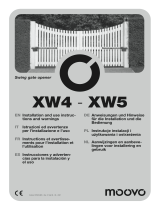 Moovo XW Owner's manual
Moovo XW Owner's manual
-
Nice Automation Walky Owner's manual
-
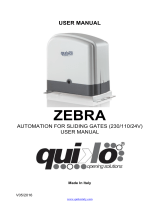 quiko Zebra Series User manual
quiko Zebra Series User manual
-
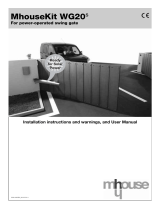 Mhouse WG10S K & WG20S Owner's manual
Mhouse WG10S K & WG20S Owner's manual
-
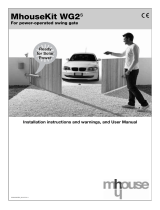 Mhouse WG2 Owner's manual
Mhouse WG2 Owner's manual
-
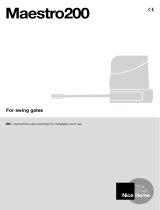 NiceHome Maestro 200 Owner's manual
NiceHome Maestro 200 Owner's manual
-
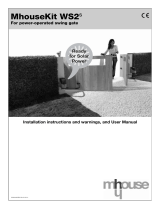 Mhouse WS2S Owner's manual
Mhouse WS2S Owner's manual
-
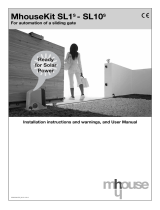 Mhouse SL1S and SL10S Owner's manual
Mhouse SL1S and SL10S Owner's manual
-
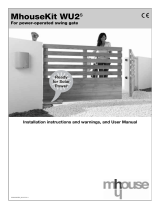 Mhouse WU2S Owner's manual
Mhouse WU2S Owner's manual
-
FAAC 780D Owner's manual
















